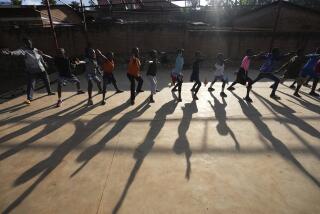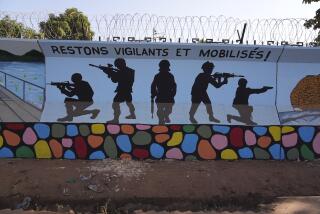U.N. Reports 300 Killed at Burundi Church
- Share via
GENEVA — Nearly 300 people seeking shelter in a Burundi church were stabbed and shot to death, U.N. officials here disclosed Friday.
The massacre happened Oct. 22 in Cibitoke, a troubled northwestern province that aid officials rarely visit, according to U.N. officials. Residents provided the aid workers with the details.
The victims apparently were Burundian Hutus fleeing fighting around refugee camps in eastern Zaire. About 70 were wounded but survived the attack, reminiscent of the 1994 church killings in neighboring Rwanda.
The U.N. Human Rights Center said it was not known who carried out the massacre.
A spokesman for Burundi’s Tutsi-led army called the U.N. report “propaganda” by Hutus in exile.
“This is pure fabrication,” Maj. Mamert Sinarizi said Friday. “I can tell you there was no massacre.”
According to the accounts, mostly based on interviews with survivors, authorities and witnesses, the refugees were spending the night in a Seventh-day Adventist church after crossing the Rusizi River from Zaire.
Armed men allegedly in uniform entered the church, told everyone to lie down and then started killing them with guns, bayonets and grenades.
About 258 people died right away, and 40 died later of their wounds, the human rights center said.
Fernando del Mundo, a spokesman for the Office of the U.N. High Commissioner for Refugees, said the massacre may be related to rebel attacks on civilians that increased after a governor of the province was killed.
The human rights center said the attack came after it had voiced “serious concern” with the Burundi government that returnees were being “channeled” into Cibitoke and Bubanza provinces.
Those are “areas where there is considerable confrontation between rebel forces and the government and where humanitarian workers have extremely limited access,” the center said.
Since fighting broke out in Zaire last month, about 45,000 Burundians have returned to Burundi. Until then, Zaire had been home to about 140,000 Burundian Hutu refugees.
More to Read
Sign up for Essential California
The most important California stories and recommendations in your inbox every morning.
You may occasionally receive promotional content from the Los Angeles Times.










